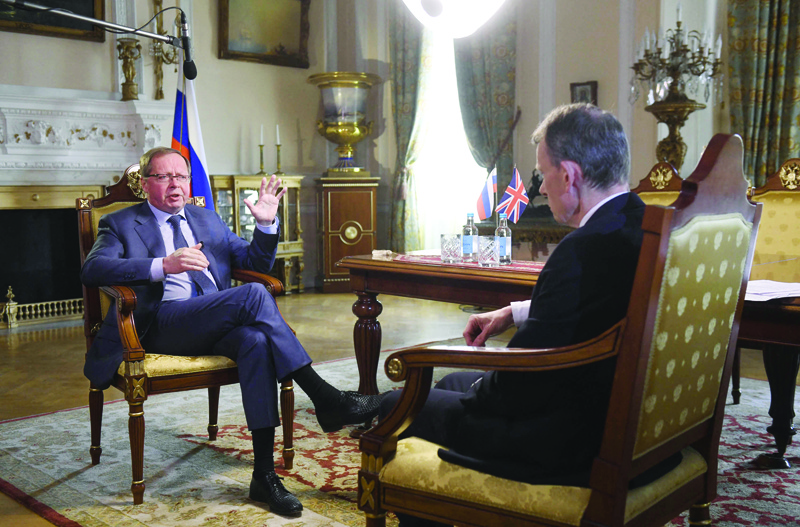 LONDON: Ambassador of Russia to the UK Andrei Kelin (left) talks during a pre-recorded interview with British journalist Andrew Marr. Britain said yesterday that it "stands in full support of our Czech allies" after Prague expelled 18 Russian diplomats identified as secret agents of the Russian intelligence service. - AFP
LONDON: Ambassador of Russia to the UK Andrei Kelin (left) talks during a pre-recorded interview with British journalist Andrew Marr. Britain said yesterday that it "stands in full support of our Czech allies" after Prague expelled 18 Russian diplomats identified as secret agents of the Russian intelligence service. - AFPPARIS: Three years after the mass expulsion of Russian diplomats from the West over the poisoning of Sergei Skripal, Moscow's representatives in Europe are coming under scrutiny again following a raft of new spy scandals. From Austria to Bulgaria, the Czech Republic, the Netherlands, Norway and Sweden, Russian diplomats have been expelled from several European countries in the past few months over Moscow's increasingly aggressive spying tactics.
The issue has become all the more acute over alleged cyberattacks by Russia on the United States, which Moscow has dismissed as nonsense but prompted the EU to issue a strong statement of solidarity. Italy was the latest country to send Russian envoys packing earlier this month after a navy captain was caught handing over classified documents to a Russian agent.
Italian Foreign Minister Luigi Di Maio summoned Russia's ambassador to Rome and expelled two diplomats over what he called a "hostile act". While Russia routinely shrugs off espionage allegations as part of an "anti-Russian campaign" orchestrated by the US or Britain, analysts say that covert Russian activities in Europe have hit a new post-Cold War peak.
Moscow response
Russia yesterday said it would retaliate against the Czech government's "unprecedented" decision to expel 18 Russian diplomats identified as secret agents. "We will take retaliatory measures that will force the authors of this provocation to understand their full responsibility for destroying the basis of normal relations between our countries," the Russian foreign ministry said in a statement.
The ministry did not specify which measures would be taken, but called the Czech announcement "absurd". On Saturday, Czech authorities said they would expel 18 Russian diplomats identified by local intelligence as secret agents of the Russian SVR and GRU security services suspected of involvement in a 2014 explosion. Czech police also said they were seeking two Russians in connection with the blast that killed two people, and who carried passports used by suspects in the attempted poisoning of former Russian double agent Sergei Skripal in 2018.
'War-time mindset'
For Mark Galeotti, a professor at University College London who specializes in Russian affairs, 2014 marked a turning point, with the uprising in Ukraine that forced out a pro-Moscow government and was seen by Russia as a Western plot. "The Russian intelligence community is now operating with a war-time mindset. They think they are in an existential struggle for Russia's place in the world," he told AFP. Andrei Soldatov, editor of the Russian news site Agentura.ru, agreed.
"Russia thinks that the slightest action by the West, such as criticism of human rights violations or the work of foreign journalists, could spark a revolution." As Russia battles to maintain its great-power status, it has begun tearing up the post-Cold War spy book. Two Russian military intelligence agents are accused of poisoning former Russian double agent Skripal, who was found slumped on a bench with his daughter in the English city of Salisbury in March 2018.
A year later, a former Chechen rebel commander was murdered in broad daylight in a Berlin park in an attack German prosecutors also believe was ordered by Russia. The West also accuses Russia of poisoning leading opposition figure Alexei Navalny with a nerve agent. Navalny, who survived after spending five months in a German hospital, was jailed on his return to Moscow.
Spies unmasked
While the ruthlessness of the attacks caused shock, analysts say the fact that that some of the operations fell short of their objectives, and that several Russian agents have been unmasked, points to a surprising degree of sloppiness. Skripal and Navalny both survived the poisoning attacks but a British woman died after picking up a perfume bottle believed to have carried the poison used against Skripal, and a British police officer was also seriously injured.
The Bellingcat investigative site meanwhile identified a dozen Russian agents by detecting patterns in the creation of fake GRU (Russian military intelligence) and FSB (Russian security agency) identities. Soldatov blamed corruption and repeated purges in security services for creating a culture of "obedient but incompetent spies". But some experts argue that the increasingly visible nature of Russia's overseas operations is deliberate.
"When you use a nerve agent like Novichok to murder someone, it's because you want it to be public knowledge," said Damien Van Puyvelde, a lecturer in intelligence and international security at the University of Glasgow. The Soufan Center, a US think tank focused on security, noted in a report that Novichok was a "cumbersome" tactic to use by the Russian security services. Russia's willingness to inflict a "slow and painful death" from a nerve agent is "designed to send a clear message to others who dare consider challenging Putin and his grip on power," it added.
Faced with Moscow's growing assertiveness, European governments are themselves also being less coy than usual. French daily Le Monde revealed in 2019 that 15 GRU agents, including the two men suspected of poisoning Skripal, had used the Alps as a rear base for operations in Europe for four years. The report quoted unnamed senior French intelligence officials. "Sometimes we decide to go public about our counter-espionage operations," a senior French official said, speaking on condition of anonymity. "Our stance is to clearly show that we will no longer tolerate these actions." - AFP










